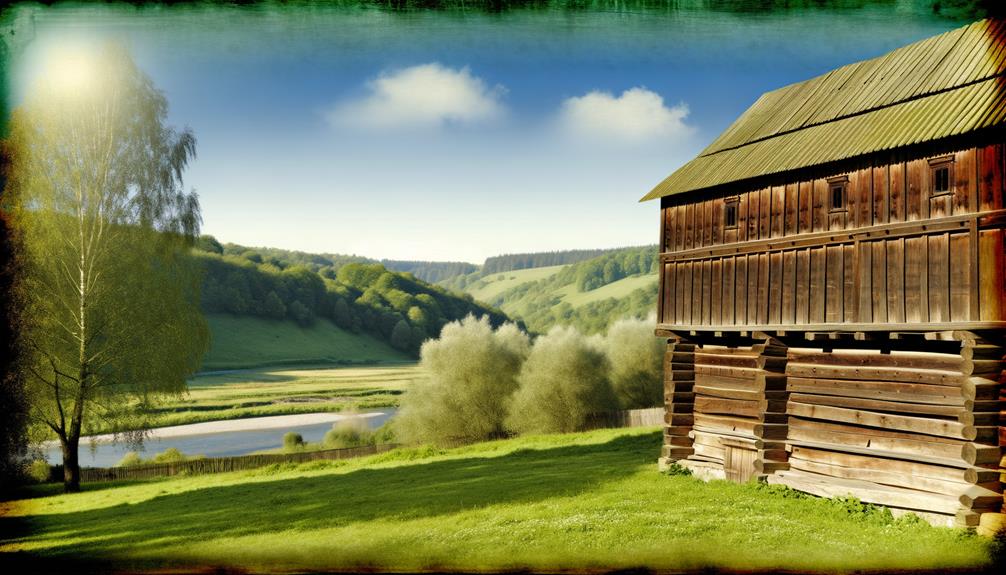Meaning of the Name Graham
The name Graham derives from the Old English 'grāham', a combination of 'grā' (gravel) and 'hām' (homestead), signifying settlements on gravelly land. First recorded in the Domesday Book of 1086, it transformed from a geographic descriptor to a Scottish clan surname in the 13th century before becoming a given name in the 19th century.
Its prevalence in the UK, US, Canada, and Australia mirrors historical migration trends. Culturally, it symbolizes strength and nobility, with notable figures like Alexander Graham Bell accentuating its legacy.
The name's nuanced history and wide-ranging influence continue to captivate those interested in its origins.

Key Takeaways
- Originates from Old English 'grāham', meaning 'gravel homestead'.
- First recorded in the Domesday Book of 1086.
- Became a surname in the 13th century, later a given name in the 19th century.
- Carries cultural significance in Scottish and British heritage, symbolizing strength and nobility.
- Popular in English-speaking countries, with notable individuals enhancing its prestige.
Etymology of Graham
The name Graham originates from the Old English word 'grāham,' which combines 'grā,' meaning gravel, and 'hām,' meaning homestead or village. This etymological composition suggests a settlement situated on a gravelly area, likely reflecting the geographical characteristics of early English locales.
The linguistic roots are deeply embedded in Anglo-Saxon culture, underscoring the significance of topography in place-naming conventions. The morpheme 'grā' is indicative of the terrain, while 'hām' denotes a place of residence, reflecting early medieval settlement patterns. This duality encapsulates both the physical and social landscapes of the period.
Understanding the etymology of Graham provides insight into the interplay between language and environment in shaping historical identities and place names.
Historical Usage
Examining the historical usage of the name Graham reveals its evolution from a geographic descriptor in Anglo-Saxon England to a prominent surname and given name in contemporary times. Originating from the Old English words 'grāg' (grey) and 'hām' (homestead), Graham was initially used to describe a specific location.
Over centuries, the name progressed into a hereditary surname, particularly among the Scottish nobility. By the 19th century, it began to gain popularity as a given name.
Key historical points:
- Medieval Period: First recorded as a place name in the Domesday Book of 1086.
- 13th Century: Adoption as a surname among the Scottish clan Graham.
- 19th Century: Emergence as a given name, particularly in English-speaking countries.
Geographic Distribution
Geographic distribution of the name Graham reveals its prevalence across several English-speaking countries, with notable concentrations in the United Kingdom, the United States, Canada, and Australia.
Originating from Scottish and English roots, the name Graham initially signified a location-based identity, particularly from Grantham in Lincolnshire. Over time, it migrated with settlers and immigrants, establishing strong footholds globally.
In the United Kingdom, it remains prevalent, particularly in Scotland and Northern England. In North America, the name gained prominence during the 19th and 20th centuries, bolstered by waves of British and Scottish migration.
In Australia, Graham similarly flourished due to colonial ties. These patterns reflect historical migration trends and the name's enduring appeal across diverse populations.
Cultural Significance
Rooted in historical and linguistic traditions, the name Graham carries significant cultural resonance, particularly within Scottish and British heritage. Its origins can be traced to the Anglo-Saxon word ‘grāham,’ meaning ‘gravelly homestead. ‘ Over centuries, it has evolved to symbolize strength and nobility. In addition to its etymological significance, the name Graham has been associated with prominent historical figures such as the influential Graham clan of Scotland. The origins of the name Wylie, on the other hand, can be found in the Old English word ‘wīglēah,’ meaning ‘warrior. ‘ This linguistic link highlights the cultural connections and historical roots embedded within surnames, serving as a testament to the rich tapestry of human history.
The cultural significance of the name Graham can be illustrated through the following key points:
- Historical Figures: Numerous notable individuals, such as Alexander Graham Bell, have elevated the name's status.
- Literature and Media: The name frequently appears in classic literature, further embedding it in cultural consciousness.
- Heraldic Emblems: The Graham family crest and tartan are emblematic of Scottish pride and identity, reflecting a deep-seated historical legacy.
Through these dimensions, the name Graham retains a profound cultural imprint.
Popularity Over Time
The name Graham has experienced fluctuating levels of popularity over the centuries, influenced by historical events and cultural shifts. Its prevalence has varied considerably across different regions, reflecting local naming conventions and societal trends.
In recent years, the name has seen a resurgence, particularly in English-speaking countries, indicating its enduring appeal and adaptability.
Historical Popularity Trends
Throughout the decades, the name Graham has experienced various fluctuations in popularity, reflecting broader cultural and societal trends. Originating from a Scottish surname, Graham gained traction in the English-speaking world during the 19th century.
Its historical popularity can be delineated through several key periods:
- 19th Century: Gained modest recognition, often linked to literary figures and prominent families.
- Mid-20th Century: Witnessed a surge, largely influenced by public figures and media personalities bearing the name.
- 21st Century: Experiencing a renaissance, particularly in English-speaking countries, driven by a preference for traditional yet distinctive names.
These temporal shifts underscore the enduring appeal and adaptability of the name Graham across different eras.
Regional Popularity Differences
Frequently, the name Graham exhibits notable regional variations in popularity, reflecting a confluence of linguistic, cultural, and social influences unique to each area. In the United Kingdom, Graham saw heightened popularity during the mid-20th century, influenced by notable public figures. Contrastingly, in the United States, the name gained traction later, peaking in the latter part of the 20th century. Australia also embraced the name, albeit with regional fluctuations tied to British cultural ties and immigration patterns. In Canada, the name maintained moderate popularity, often mirroring trends observed in the UK and US. These variations underscore the complex interplay of historical events, prominent personalities, and regional preferences.
| Region | Peak Popularity Period |
|---|---|
| United Kingdom | Mid-20th century |
| United States | Late 20th century |
| Australia | Varied with British influence |
| Canada | Mid to late 20th century |
Popularity in Modern Times
In modern times, the popularity of the name Graham has experienced a nuanced trajectory, reflecting evolving cultural trends and demographic shifts across different regions. Historically rooted in Scottish heritage, the name has seen varied levels of adoption globally.
Its modern-day usage can be analyzed through several lenses:
- Regional Variations: In the United States, the name Graham has seen periodic rises, particularly in the late 20th and early 21st centuries, while remaining consistently popular in the United Kingdom and Canada.
- Cultural Influence: Media and public figures, such as Graham Norton and Graham Greene, have contributed to its sustained visibility.
- Demographic Trends: The name has fluctuated in popularity, often aligned with broader naming trends that favor traditional yet distinctive names.
This multifaceted analysis underscores the complex dynamics influencing Graham's modern appeal.
Famous Namesakes
Renowned individuals bearing the name Graham have made significant contributions across various fields, demonstrating the name's enduring legacy and cultural impact.
Historian Graham Greene, a literary luminary, profoundly influenced 20th-century English literature with his compelling narratives and exploration of moral complexities.
In the domain of music, Graham Nash, co-founder of the iconic bands The Hollies and Crosby, Stills & Nash, left an indelible mark on the rock and folk genres.
Additionally, Graham Bell, often known as Alexander Graham Bell, is celebrated for his groundbreaking invention of the telephone, revolutionizing global communication.
Each of these figures underscores the name Graham's historic resonance and its association with innovation, creativity, and intellectual depth, enriching the cultural tapestry across generations.
Modern Interpretations
Building on the illustrious legacy of historical figures, the contemporary interpretation of the name Graham continues to reflect attributes of innovation, creativity, and intellectual depth in various modern contexts. These qualities are often observed in individuals who bear the name today, contributing to its enduring prestige.
Modern interpretations highlight:
- Innovation: Many Grahams have made significant contributions in fields such as technology, science, and business, showcasing their forward-looking capabilities.
- Creativity: The name is frequently associated with artistic endeavors, including literature, music, and visual arts, reflecting a deep reservoir of creative talent.
- Intellectual Depth: Grahams often excel in academia and research, demonstrating profound analytical skills and a dedication to intellectual pursuits.
These attributes guarantee the name Graham remains relevant and esteemed.
Conclusion
Graham, with its roots in Old English and Scottish heritage, has traversed centuries and continents, acquiring rich historical and cultural layers.
The name's geographic spread speaks to its widespread appeal, while its sustained popularity underscores a timeless charm.
Coincidentally, notable bearers of the name across diverse fields further enhance its prestige.
Modern interpretations continue to evolve, reflecting societal changes.
Consequently, the name Graham encapsulates a unique blend of linguistic heritage, enduring appeal, and cultural significance.






